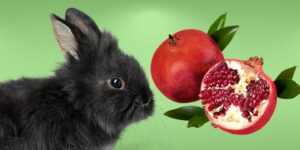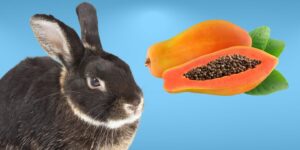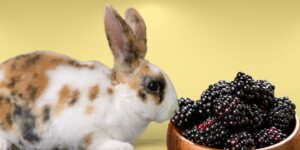Yes, rabbits can eat cherry tomatoes in moderation as part of a well-rounded diet. It is important to feed rabbits cherry tomatoes in small amounts, as they are high in natural sugars and should not make up a significant portion of a rabbit's diet. A balanced diet is essential for rabbits, which typically includes hay, pellets, water, and a variety of vegetables and fruits, including cherry tomatoes.
Introduction
What are cherry tomatoes?
Cherry tomatoes are small, round tomatoes that come in various colors, such as red, yellow, and orange. They are known for their sweet flavor and juicy texture, and they are often used in salads or eaten as a healthy snack.
Can rabbits eat vegetables and fruits?
Rabbits can and should eat a variety of vegetables and fruits as part of a healthy diet. Hay should make up the majority of their diet, with a smaller portion consisting of vegetables, fruits, and pellets.
Importance of a balanced diet for rabbits
A balanced diet is crucial for maintaining a rabbit's overall health and wellbeing, ensuring proper digestive function, and preventing obesity and other diet-related issues.
Nutritional benefits of cherry tomatoes for rabbits
Vitamins and minerals in cherry tomatoes
Cherry tomatoes are a good source of vitamins A and C, which are essential for a rabbit's immune system and overall health. They also contain other essential vitamins and minerals such as potassium and magnesium.
Antioxidants and other health benefits
Cherry tomatoes are high in antioxidants, including lycopene, which can help protect your rabbit's cells from damage and provide other health benefits.
Hydration from cherry tomatoes
Cherry tomatoes have a high water content, providing extra hydration for your rabbit when consumed in moderation.
Potential risks of feeding cherry tomatoes to rabbits
High sugar content
Impact of sugar on rabbit's digestion
Cherry tomatoes are high in natural sugars, which can cause digestive issues if consumed in large amounts. It is essential to feed cherry tomatoes in moderation to prevent diarrhea or other gastrointestinal problems.
Impact of sugar on rabbit's weight
The high sugar content in cherry tomatoes can also contribute to weight gain if fed too often. It is crucial to monitor your rabbit's weight and ensure they are not gaining too much from their diet.
Pesticides and chemicals
Choosing organic cherry tomatoes
Selecting organic cherry tomatoes can help reduce the risk of exposing your rabbit to potentially harmful pesticides and chemicals.
Importance of washing cherry tomatoes
Always wash cherry tomatoes thoroughly before feeding them to your rabbit to remove any potential contaminants.
How to feed cherry tomatoes to rabbits
Introducing cherry tomatoes to rabbit's diet
When feeding cherry tomatoes to rabbits, start with one or two cherry tomatoes as a treat a few times per week. Gradually increase the portion size to see how your rabbit reacts.
Portion sizes and frequency
Offer cherry tomatoes in moderation and monitor your rabbit's weight and overall health. A rabbit's portion size should be tailored to their individual needs based on their age, size, and activity level.
Combining cherry tomatoes with other vegetables and fruits
It is essential to provide your rabbit with a mix of vegetables and fruits to ensure a balanced and varied diet. Cherry tomatoes can be combined with other safe options like leafy greens, bell peppers, or cucumbers.
Rabbit's individual preferences and reactions
Each rabbit is unique, and not all rabbits will enjoy or tolerate cherry tomatoes. Always monitor your rabbit's behavior and reaction when introducing new foods into their diet.
Alternatives to cherry tomatoes for rabbits
Other safe vegetables and fruits
If your rabbit does not tolerate or enjoy cherry tomatoes, there are many other safe vegetables and fruits to include in their diets, such as carrots, bell peppers, cucumbers, and leafy greens.
Foods to avoid in a rabbit's diet
Some foods are unsafe for rabbits and should be avoided, including onions, avocados, and rhubarb. Always research before introducing any new food to your rabbit’s diet.
Monitoring your rabbit's health
Signs of digestive issues in rabbits
Monitor your rabbit for any signs of digestive issues, such as diarrhea or constipation, after introducing cherry tomatoes into their diet. If you notice any problems, discontinue feeding cherry tomatoes and consult your veterinarian.
Weight management in rabbits
Pay close attention to your rabbit's weight when introducing cherry tomatoes to their diet. If you notice any weight gain, adjust the portion size or frequency accordingly.
Regular veterinary check-ups
Regular vet check-ups can help ensure your rabbit's health and catch any potential diet-related issues early.
Conclusion
In conclusion, rabbits can safely eat cherry tomatoes in moderation as part of a well-rounded diet. It is important to feed them in small amounts and to monitor the rabbit's weight and overall health to ensure that they are not experiencing any negative effects from eating cherry tomatoes. With proper feeding and monitoring, cherry tomatoes can be a healthy and enjoyable treat for rabbits.











